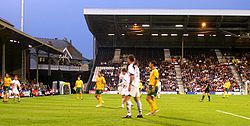New Zealand national football
team
From Wikipedia, the free encyclopedia
| For current information on this topic, see New Zealand national football team results. |
 | |||
| Nickname(s) | All Whites | ||
|---|---|---|---|
| Association | New Zealand Football (NZF) | ||
| Confederation | OFC (Oceania) | ||
| Head coach | Ricki Herbert | ||
| Captain | Ryan Nelsen | ||
| Most caps | Ivan Vicelich (66) 1 | ||
| Top scorer | Vaughan Coveny (28) | ||
| Home stadium | North Harbour Stadium (Auckland) Westpac Stadium (Wellington) | ||
| FIFA code | NZL | ||
| FIFA ranking | 78 | ||
| Highest FIFA ranking | 47 (August 2002) | ||
| Lowest FIFA ranking | 156 (September 2007) | ||
| Elo ranking | 74 | ||
| Highest Elo ranking | 39 (June 1983) | ||
| Lowest Elo ranking | 95 (September 1997, February 1998) | ||
| First international | |||
Australia (Dunedin, New Zealand; 17 June 1922) | |||
| Biggest win | |||
0 Fiji (Auckland, New Zealand; 16 August 1981) | |||
| Biggest defeat | |||
10 Australia (Wellington, New Zealand; 11 July 1936) | |||
| World Cup | |||
| Appearances | 2 (First in 1982) | ||
| Best result | Round 1, 1982 | ||
| OFC Nations Cup | |||
| Appearances | 8 (First in 1973) | ||
| Best result | Champions, 1973, 1998, 2002 and 2008 | ||
| Confederations Cup | |||
| Appearances | 3 (First in 1999) | ||
| Best result | Round 1, 1999, 2003 and 2009 | ||
The New Zealand national football team, nicknamed the All
Whites, is the national association football team of New
Zealand and is governed by New Zealand Football (NZF). The team
plays in an all-white strip, hence its nickname (the name is also a
reference to the perhaps more famous New Zealand Rugby Union team, the All
Blacks).
The All Whites played in the 1982 FIFA World Cup and on 14 November 2009 qualified
for the 2010 FIFA World Cup. Because of the lack
of a high-quality domestic league, most top New Zealand footballers
play in the leagues of Europe, in the United States, or in the Australasian
A-League.
New Zealand formerly battled Australia
for top honours in the Oceania Football Confederation
(OFC). This
is no longer the case as Australia now plays in the Asian Football Confederation
(AFC), leaving New Zealand as the only seeded team in the OFC. New
Zealand has won the OFC Nations Cup four times - in 1973, 1998, 2002 and 2008.
Development
Despite its large player numbers, football in New Zealand struggles
to compete with other sports such as rugby
union, rugby league and cricket,
financially and for media exposure. The performance of the national
team is further hindered by a relatively young semi-professional
domestic league, the New Zealand Football
Championship having been established in 2004. New Zealand has one
professional team, Wellington Phoenix, which competes in
the Australian A-League.
Since the 1990s, United States college soccer has played a significant role in the
development of New Zealand players. This influence began when former Scotland international Bobby Clark returned to the U.S.
after his 1994–96 stint as All Whites head coach to take the head
coaching job at Stanford University (he now holds the
same position at Notre Dame). Clark began
recruiting in New Zealand, and current All Whites Ryan
Nelsen and Simon Elliott played for him at Stanford. The
trend that Clark started has continued to the present; more than two
dozen New Zealanders are now playing for NCAA Division I men's programs in the U.S.[1]
A common next step in these players' career paths is a stint in Major League Soccer; ESPNsoccernet
journalist Brent Latham speculated in a March 2010 story that the All
Whites' 2010 FIFA World Cup squad could have
more MLS players than the U.S. squad.[1][2]
However, Latham's speculation did not prove true, as only one MLS
player made the New Zealand squad for the World Cup.
The best known current players are Blackburn Rovers defender Nelsen,
former Roda
JC defender Ivan Vicelich, Gold Coast United striker Shane
Smeltz, Middlesbrough striker Chris
Killen and Plymouth Argyle striker Rory
Fallon. Several young players have shown promise in breaking
through into the senior side, including Barnet FC midfielder Chris James, Newcastle Jets midfielder Jeremy Brockie, Shrewsbury Town striker Kris
Bright and West Bromwich Albion striker Chris Wood.
Overall record
| Matches | Pld | W | D | L | GF | GA | GD |
|---|---|---|---|---|---|---|---|
| Internationals only | 309 | 132 | 49 | 124 | 582 | 492 | + 90 |
| All | 531 | 211 | 84 | 236 | 976 | 999 | - 23 |
Players
Current squad
The following players were named in the final 23-man squad for the 2010 FIFA World Cup. Caps and goals updated as May
29, 2010.
Caps and goals accurate up to and including the friendly match
against Slovenia on 4 June 2010, and
only include appearances in official matches.











0 comments